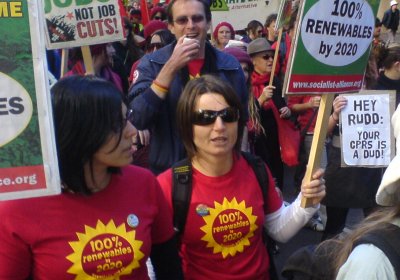Prime Minister Julia Gillard was supposed to launch Labor's new policy to tackle climate change on July 23. But in essence she merely restated the same old Labor climate policy: delay, delay and delay again.
Gillard's speech was pages long, but her climate agenda can be summarised in just four words: more talk, less action.
Environment
This election campaign is crazy.
It’s crazy that so much fear is being whipped up about the few thousand of the world's 43 million refugees and displaced people who manage to get on a leaky boat to Australia.
But neither mainstream party is willing to stop sending troops to the decade-long military occupation of Afghanistan. This war is largely responsible for 2.8 million Afghan refugees worldwide — the same war is opposed by most in Afghanistan and most citizens of the countries whose armies occupy it.
PM Julia Gillard was supposed to launch Labor's new policy to tackle climate change on July 23. But in essence she merely restated the same old Labor climate policy: delay, delay and delay again.
Gillard's speech was pages long, but her climate agenda can be summarised in just four words — more talk, less action.
The core promise was that her government would create a "citizens assembly" to discuss options to deal with global warming. Perhaps the government will propose the ice caps and glaciers hold off from melting until Gillard's august assembly has concluded its deliberations.
“The poisoning of groundwater near Kingaroy is just the tip of the iceberg with coal seam gas [CSG] extraction”, climate change activist and Socialist Alliance candidate for the seat of Brisbane Ewan Saunders told Green Left Weekly.
The contamination of groundwater by toxic chemicals was revealed two weeks ago, sparking calls for urgent action against the CSG industry, which is rapidly expanding in south-eastern Queensland.
On July 31, 100 anti-uranium mining protesters rallied outside the Esplanade Hotel in Fremantle, which was hosting the Australian Uranium Conference.
WA Liberal Premier Colin Barnett lifted the ban on uranium mining in November 2008 soon after winning office.
There are no commercial uranium mines operating in the state but the Australian Uranium Association has identified eight major uranium deposits in WA.
The Anti-Nuclear Alliance of WA (ANAWA), which organised the protest, said there are 137 mining companies with uranium interests in the state.
A draft program for the Climate Change Social Change conference, over November 5-7, has been released and is available on the conference website.
Major conference sessions include topics such as: “A safe climate — what will it take?”; “Climate justice: their agenda and ours”; “Food sovereignty for surviva”l; and “The global economic crisis and the ecological revolution”.
Forget about the climate science and the record high temperatures. Prime Minister Julia Gillard has decided she doesn’t need a serious climate change policy to win the federal election.
In its place, she kicked off her election campaign on July 18 with a “sustainable Australia” policy. It promised a future of low population growth, which “preserves our quality of life and respects our environment”.
Opposition leader and climate denier Tony Abbott was quick to say he fully agreed with this vision, but was even more committed to it than Gillard.
Pressure is now bearing down on the Australian climate movement because there has been so little forward progress in the federal government’s climate policy.
The pressure is for the movement to accept, support and campaign for weak and inadequate climate policies on the grounds that something is better than nothing.
This is plain from looking at the new, media-driven “consensus” about the need for a “price on carbon”.
Forty activists held a protest on July 15 against the expansion of the Olympic Dam uranium mine.
They blockaded the entrance to highlight the catastrophic effects the mine and its expansion would have on traditional owners, their land and future generations.
Catrina Staurmberg, at the protest, said: “This is a toxic mine, no one is safe. Radioactive material does not discriminate. If the open-cut expansion or any kind of uranium mining continues it will put many lives at risk across the country.
The article below is the Socialist Alliance’s updated Climate Charter. For more information, visit the Socialist Alliance website.
* * *
For years, climate scientists have warned us that we need to act on climate change. Now, science is saying that climate change is taking place more rapidly than everyone previously thought.
The warning signs are obvious. April and May were the world’s hottest months since records began. This year’s Arctic ice sheet melt is taking place at a pace never seen before.
SYDNEY — Dr Adam Lucas, the Sydney coordinator of the climate research and advocacy group Beyond Zero Emissions (BZE), told a July 14 meeting that BZE's stationary energy plan showed it was possible for Australian to move to 100% renewable energy in a decade.
Lucas gave an outline of the report, which will be launched publicly in Sydney in August.
Existing levels of greenhouse gases may be enough to push Arctic temperatures 19°C higher, a recent study has found.
A University of Colorado at Boulder scientific expedition to Ellesmere Island in the high Arctic found evidence that the ice cap may be far more sensitive to warming than had been thought, the team said on June 29.
The team used fossil records to measure temperatures on the island during the Pliocene period — 2.6 to 5.3 million years ago.
The research confirmed the area was mostly ice-free and about 19°C warmer on average than it is now.
- Previous page
- Page 284
- Next page








